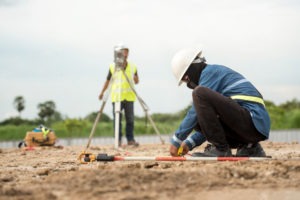
Whether you’re buying or selling a house, vacant land, or a commercial property, one of the most important (and awkward) conversations you need to have is who is paying for the survey. It can be confusing—it’s the seller’s property, but the buyer is the one who needs to know the details.
Learn more about who pays for a land survey and what assessments are best for people buying or selling property. If you have any questions about your situation or want to get a quote on your survey, you can talk to a professional land surveyor from our company for free.
Types of Land Surveys
Not every survey is the same. Depending on your sale or transaction, you may need a more in-depth assessment or more specialized services. What type of survey you order will decide how much the evaluation costs and what information you receive.
Types of surveys that you might need for your transaction include:
Boundary Surveys
A boundary survey shows the borders of your property, along with where your structures are in relation to those boundary lines and any disputes there might be with neighboring properties. These are generally considered the simplest survey you can get, and they usually take less time and money than other, more in-depth surveys.
If you’re buying or selling a single-family home or other small, residential property, a boundary survey may be all that’s necessary. These also come in handy when you’re planning a new project like simple landscaping or a new fence, shed, or other small structure. Boundary surveys help you see where your property stops so that you can avoid legal issues.
ALTA/NSPS Land Title Surveys
Where boundary surveys show the basics, ALTA/NSPS surveys show everything else. They’re the souped-up, upgraded version of a boundary survey, giving you information on boundary lines as well as improvements, utilities, easements, and other in-depth details.
ALTA/NSPS land title surveys follow national standards set by the American Land Title Association (ALTA) and the National Society of Professional Surveyors (NSPS). Because of that, the ALTA/NSPS survey that you get will be the same quality as one done by any other survey company across the country.
The standardization and comprehensive detail of ALTA/NSPS land title surveys make them a popular choice for the sale of commercial properties or larger tracts of land. They’re also popular with mortgage companies and land title insurers, who protect the interests of buyers, sellers, and lenders involved in larger sales.
FEMA Elevation Certificates
While these surveys aren’t technically applicable to the sale of a home or piece of land, buyers often find that they need a FEMA elevation certificate when figuring out insurance for their new property. If your property is in a flood zone, you should have flood insurance, and FEMA certificates are usually necessary for that.
Sometimes, a FEMA elevation certificate is already on file with the previous owner. If that’s the case, you don’t need a new one. If that’s not the case, a surveyor can come to your property, evaluate the flood-prone areas of your land and structure, and fill out the paperwork you need.
Who Pays for a New Survey?
There is no universal rule or law that says who has to pay for a land survey. As a rule of thumb, the person who requests the survey is the one that pays for it. That means if you’re selling a property and the buyer wants a survey of your land, they are responsible for footing the bill.
That applies to situations in which one party contacts the survey company on another’s behalf. Landowners are usually the ones actually ordering the survey, but buyers usually have to pay them back or give the money directly to the survey company. However, sellers sometimes proactively order surveys to attract interested parties.
This may be different when you’re dealing with mortgage companies or insurers. You should always consult with them as to who is paying for the survey—there is a chance that they are willing to compensate you for the expenses.
Negotiating the Price of Your Survey
Just because there’s a general way things go doesn’t mean it’s a hard and fast rule. Some sellers or buyers are willing to negotiate or split the cost of a survey. There may even be a part of the purchase offer that includes the seller co-sponsoring or even fully paying for the survey.
Before you get a survey, it’s always worth asking and trying to negotiate a deal. Even if negotiations don’t go your way, though, you can rest assured that survey costs won’t break the bank. Land surveys are generally fairly affordable compared to other costs involved with buying land.
How Much does a Land Survey Cost?
One factor that may complicate the process of figuring out who is paying for what is the fact that there’s no set price tag on any survey. Land survey costs can range widely, and the price will depend on the size of the land and the type of survey you order.
For example, if you get a boundary survey for a smaller property, the price will be relatively cheap. However, as properties get larger and surveys get more in-depth, costs go up as well.
Your best bet is to get a free estimate from a professional land surveyor. Our engineers are licensed in multiple states and are on call to talk to interested parties about their needs and options. We can tell you how much your next survey is likely to cost, as well as what it can show you about your property.
Get a Free Estimate on a Land Survey
If you’re the one paying for a survey, you shouldn’t have to go into that decision blind. A free estimate from a Scalice Land Surveying, P.C., land surveyor can show you what you may have to pay for your evaluation.
Our professionals can also help you understand what a surveyor will do on your land and what information the assessment will procure. Call us or contact us online for a FREE estimate on your next survey.



